Economic Report: Import Quotas, Automotive Industry, and Trade
VerifiedAdded on 2020/06/05
|6
|1647
|447
Report
AI Summary
This report provides a critical analysis of import quotas, focusing on their implementation and impact within the automotive industry. The introduction highlights the use of quotas to protect domestic markets, particularly in Saudi Arabia, and their effects on tariffs and consumer demand. The main body delves into the historical context of import quotas, using the US automotive sector in the 1980s as a case study, examining how quotas were used to address the influx of imported vehicles. The report explores the economic implications of quotas, including their influence on product prices, government revenue, and the balance of trade. It discusses the benefits for local producers and the costs for consumers, including the concept of a hidden tax. The report also examines the impact of quotas on employment, trade imbalances, and the ability of domestic industries to adapt to global competition. The conclusion emphasizes the need for careful consideration of the costs and benefits before implementing import quotas, particularly in relation to small-scale businesses and consumer welfare. The report references several academic sources that support the analysis.

Critical Thinking
Paraphrase This Document
Need a fresh take? Get an instant paraphrase of this document with our AI Paraphraser
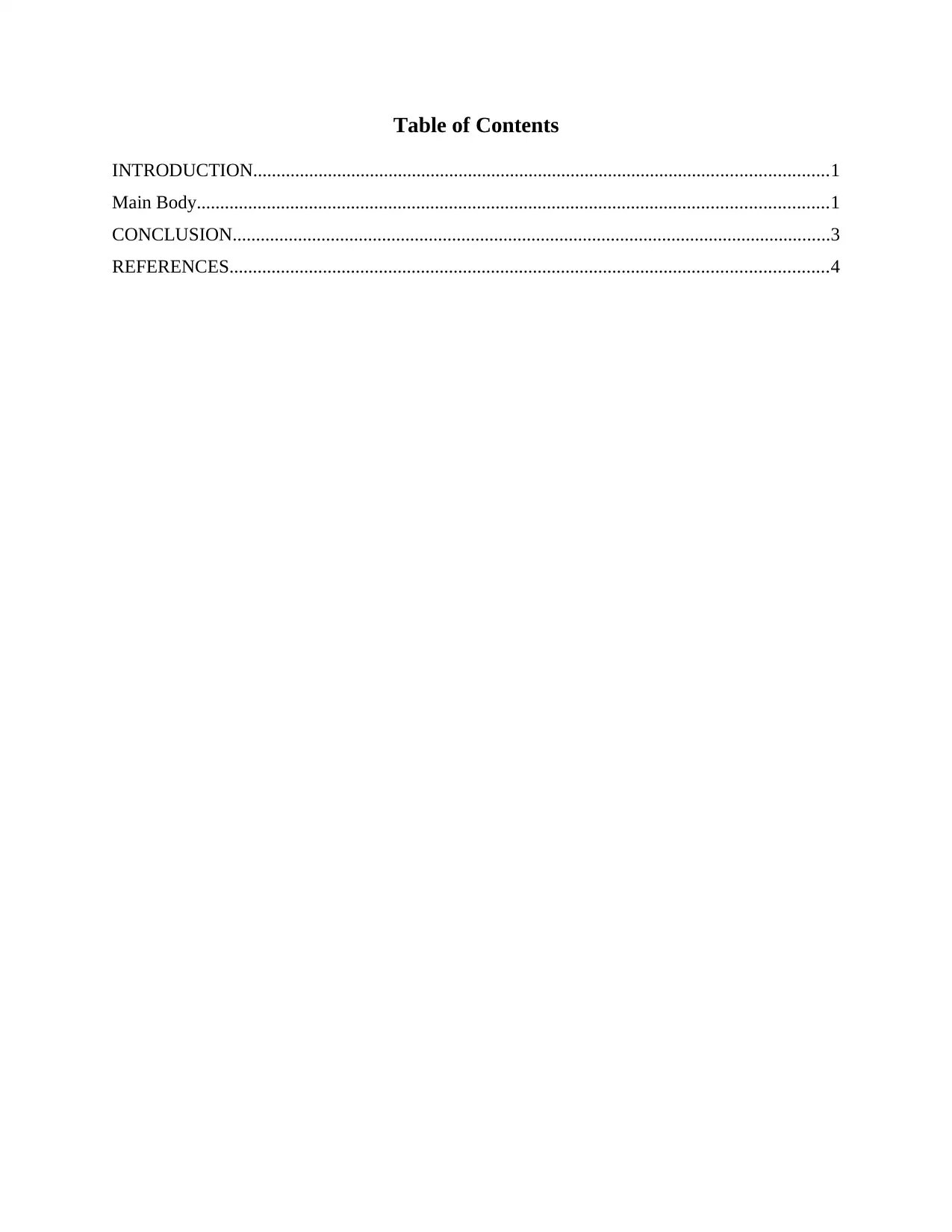
Table of Contents
INTRODUCTION...........................................................................................................................1
Main Body.......................................................................................................................................1
CONCLUSION................................................................................................................................3
REFERENCES................................................................................................................................4
INTRODUCTION...........................................................................................................................1
Main Body.......................................................................................................................................1
CONCLUSION................................................................................................................................3
REFERENCES................................................................................................................................4
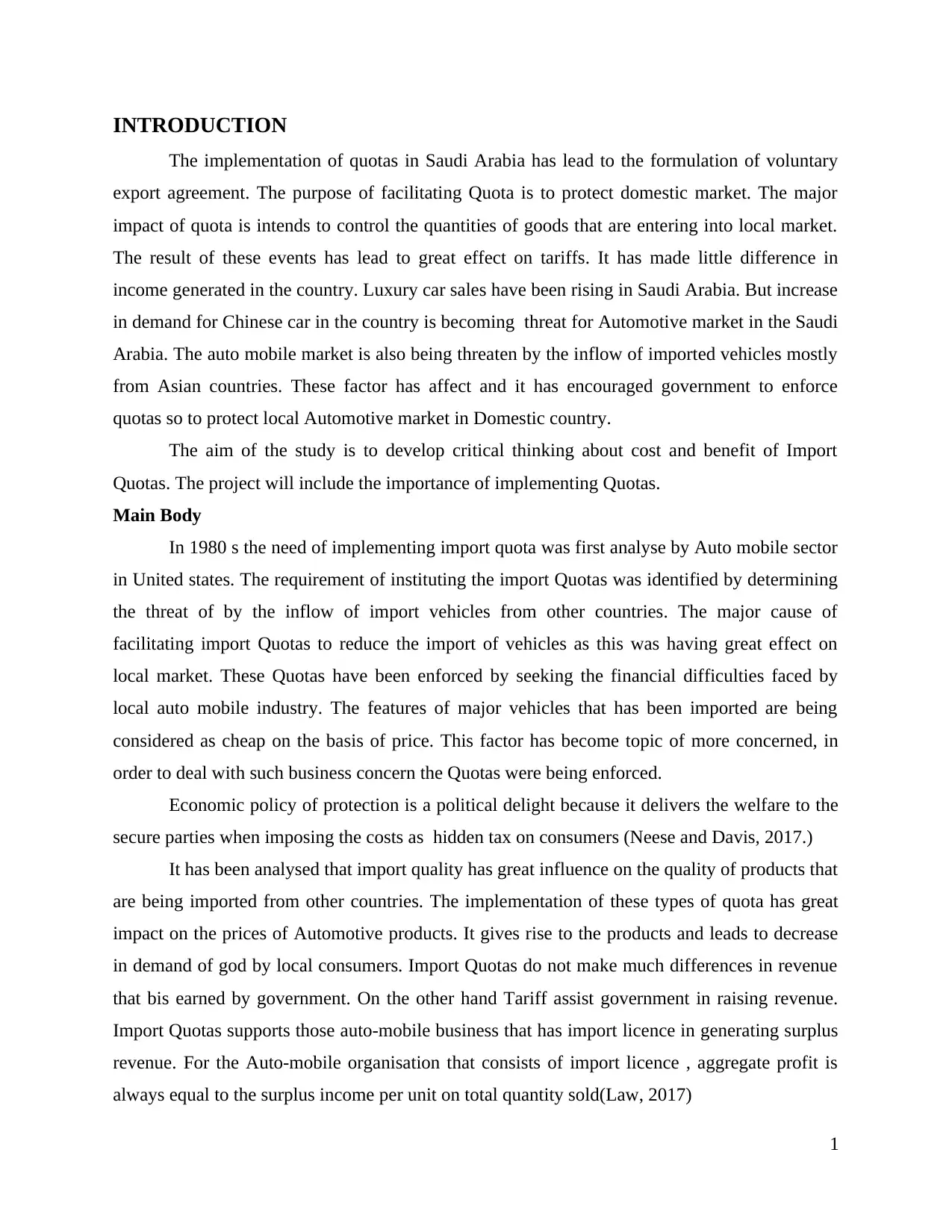
INTRODUCTION
The implementation of quotas in Saudi Arabia has lead to the formulation of voluntary
export agreement. The purpose of facilitating Quota is to protect domestic market. The major
impact of quota is intends to control the quantities of goods that are entering into local market.
The result of these events has lead to great effect on tariffs. It has made little difference in
income generated in the country. Luxury car sales have been rising in Saudi Arabia. But increase
in demand for Chinese car in the country is becoming threat for Automotive market in the Saudi
Arabia. The auto mobile market is also being threaten by the inflow of imported vehicles mostly
from Asian countries. These factor has affect and it has encouraged government to enforce
quotas so to protect local Automotive market in Domestic country.
The aim of the study is to develop critical thinking about cost and benefit of Import
Quotas. The project will include the importance of implementing Quotas.
Main Body
In 1980 s the need of implementing import quota was first analyse by Auto mobile sector
in United states. The requirement of instituting the import Quotas was identified by determining
the threat of by the inflow of import vehicles from other countries. The major cause of
facilitating import Quotas to reduce the import of vehicles as this was having great effect on
local market. These Quotas have been enforced by seeking the financial difficulties faced by
local auto mobile industry. The features of major vehicles that has been imported are being
considered as cheap on the basis of price. This factor has become topic of more concerned, in
order to deal with such business concern the Quotas were being enforced.
Economic policy of protection is a political delight because it delivers the welfare to the
secure parties when imposing the costs as hidden tax on consumers (Neese and Davis, 2017.)
It has been analysed that import quality has great influence on the quality of products that
are being imported from other countries. The implementation of these types of quota has great
impact on the prices of Automotive products. It gives rise to the products and leads to decrease
in demand of god by local consumers. Import Quotas do not make much differences in revenue
that bis earned by government. On the other hand Tariff assist government in raising revenue.
Import Quotas supports those auto-mobile business that has import licence in generating surplus
revenue. For the Auto-mobile organisation that consists of import licence , aggregate profit is
always equal to the surplus income per unit on total quantity sold(Law, 2017)
1
The implementation of quotas in Saudi Arabia has lead to the formulation of voluntary
export agreement. The purpose of facilitating Quota is to protect domestic market. The major
impact of quota is intends to control the quantities of goods that are entering into local market.
The result of these events has lead to great effect on tariffs. It has made little difference in
income generated in the country. Luxury car sales have been rising in Saudi Arabia. But increase
in demand for Chinese car in the country is becoming threat for Automotive market in the Saudi
Arabia. The auto mobile market is also being threaten by the inflow of imported vehicles mostly
from Asian countries. These factor has affect and it has encouraged government to enforce
quotas so to protect local Automotive market in Domestic country.
The aim of the study is to develop critical thinking about cost and benefit of Import
Quotas. The project will include the importance of implementing Quotas.
Main Body
In 1980 s the need of implementing import quota was first analyse by Auto mobile sector
in United states. The requirement of instituting the import Quotas was identified by determining
the threat of by the inflow of import vehicles from other countries. The major cause of
facilitating import Quotas to reduce the import of vehicles as this was having great effect on
local market. These Quotas have been enforced by seeking the financial difficulties faced by
local auto mobile industry. The features of major vehicles that has been imported are being
considered as cheap on the basis of price. This factor has become topic of more concerned, in
order to deal with such business concern the Quotas were being enforced.
Economic policy of protection is a political delight because it delivers the welfare to the
secure parties when imposing the costs as hidden tax on consumers (Neese and Davis, 2017.)
It has been analysed that import quality has great influence on the quality of products that
are being imported from other countries. The implementation of these types of quota has great
impact on the prices of Automotive products. It gives rise to the products and leads to decrease
in demand of god by local consumers. Import Quotas do not make much differences in revenue
that bis earned by government. On the other hand Tariff assist government in raising revenue.
Import Quotas supports those auto-mobile business that has import licence in generating surplus
revenue. For the Auto-mobile organisation that consists of import licence , aggregate profit is
always equal to the surplus income per unit on total quantity sold(Law, 2017)
1
⊘ This is a preview!⊘
Do you want full access?
Subscribe today to unlock all pages.

Trusted by 1+ million students worldwide
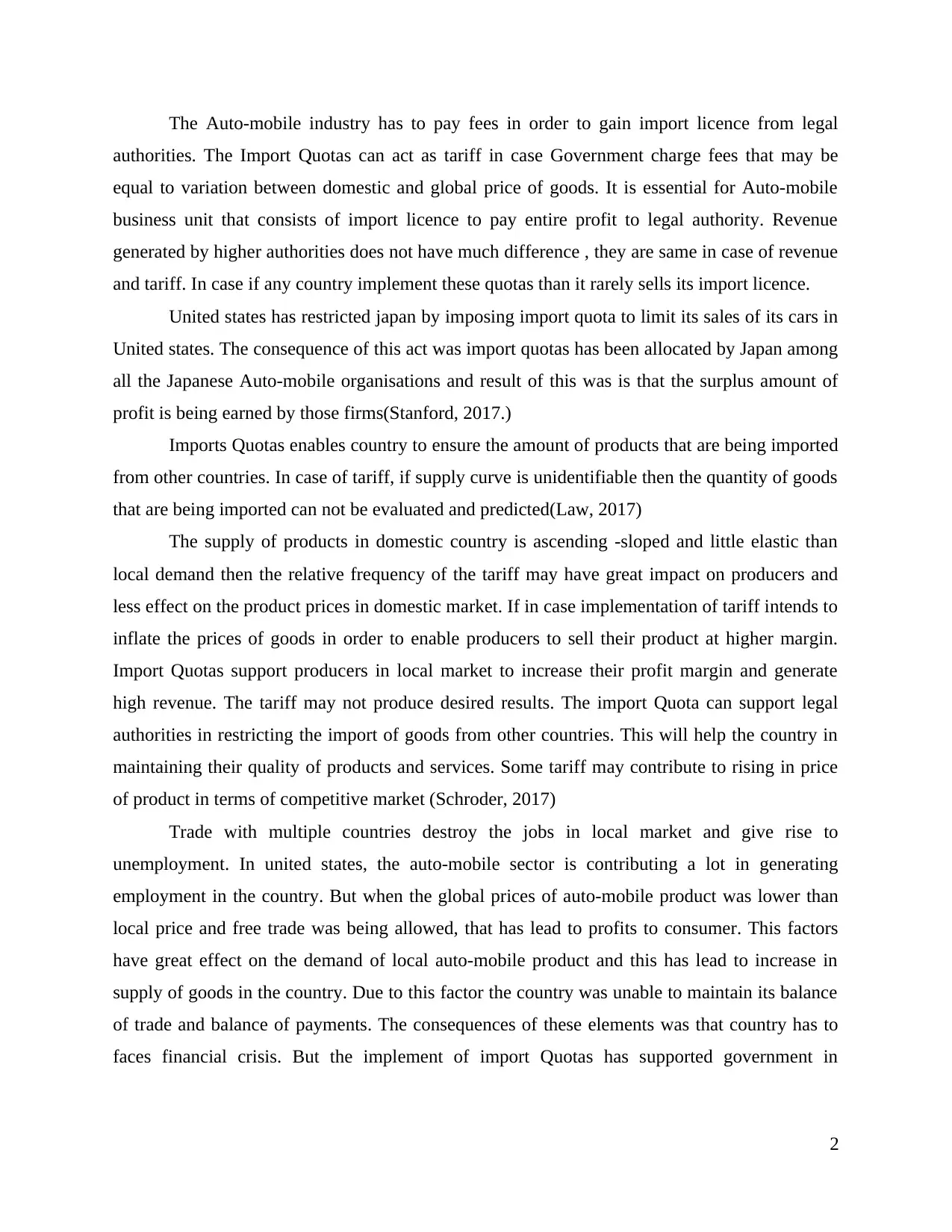
The Auto-mobile industry has to pay fees in order to gain import licence from legal
authorities. The Import Quotas can act as tariff in case Government charge fees that may be
equal to variation between domestic and global price of goods. It is essential for Auto-mobile
business unit that consists of import licence to pay entire profit to legal authority. Revenue
generated by higher authorities does not have much difference , they are same in case of revenue
and tariff. In case if any country implement these quotas than it rarely sells its import licence.
United states has restricted japan by imposing import quota to limit its sales of its cars in
United states. The consequence of this act was import quotas has been allocated by Japan among
all the Japanese Auto-mobile organisations and result of this was is that the surplus amount of
profit is being earned by those firms(Stanford, 2017.)
Imports Quotas enables country to ensure the amount of products that are being imported
from other countries. In case of tariff, if supply curve is unidentifiable then the quantity of goods
that are being imported can not be evaluated and predicted(Law, 2017)
The supply of products in domestic country is ascending -sloped and little elastic than
local demand then the relative frequency of the tariff may have great impact on producers and
less effect on the product prices in domestic market. If in case implementation of tariff intends to
inflate the prices of goods in order to enable producers to sell their product at higher margin.
Import Quotas support producers in local market to increase their profit margin and generate
high revenue. The tariff may not produce desired results. The import Quota can support legal
authorities in restricting the import of goods from other countries. This will help the country in
maintaining their quality of products and services. Some tariff may contribute to rising in price
of product in terms of competitive market (Schroder, 2017)
Trade with multiple countries destroy the jobs in local market and give rise to
unemployment. In united states, the auto-mobile sector is contributing a lot in generating
employment in the country. But when the global prices of auto-mobile product was lower than
local price and free trade was being allowed, that has lead to profits to consumer. This factors
have great effect on the demand of local auto-mobile product and this has lead to increase in
supply of goods in the country. Due to this factor the country was unable to maintain its balance
of trade and balance of payments. The consequences of these elements was that country has to
faces financial crisis. But the implement of import Quotas has supported government in
2
authorities. The Import Quotas can act as tariff in case Government charge fees that may be
equal to variation between domestic and global price of goods. It is essential for Auto-mobile
business unit that consists of import licence to pay entire profit to legal authority. Revenue
generated by higher authorities does not have much difference , they are same in case of revenue
and tariff. In case if any country implement these quotas than it rarely sells its import licence.
United states has restricted japan by imposing import quota to limit its sales of its cars in
United states. The consequence of this act was import quotas has been allocated by Japan among
all the Japanese Auto-mobile organisations and result of this was is that the surplus amount of
profit is being earned by those firms(Stanford, 2017.)
Imports Quotas enables country to ensure the amount of products that are being imported
from other countries. In case of tariff, if supply curve is unidentifiable then the quantity of goods
that are being imported can not be evaluated and predicted(Law, 2017)
The supply of products in domestic country is ascending -sloped and little elastic than
local demand then the relative frequency of the tariff may have great impact on producers and
less effect on the product prices in domestic market. If in case implementation of tariff intends to
inflate the prices of goods in order to enable producers to sell their product at higher margin.
Import Quotas support producers in local market to increase their profit margin and generate
high revenue. The tariff may not produce desired results. The import Quota can support legal
authorities in restricting the import of goods from other countries. This will help the country in
maintaining their quality of products and services. Some tariff may contribute to rising in price
of product in terms of competitive market (Schroder, 2017)
Trade with multiple countries destroy the jobs in local market and give rise to
unemployment. In united states, the auto-mobile sector is contributing a lot in generating
employment in the country. But when the global prices of auto-mobile product was lower than
local price and free trade was being allowed, that has lead to profits to consumer. This factors
have great effect on the demand of local auto-mobile product and this has lead to increase in
supply of goods in the country. Due to this factor the country was unable to maintain its balance
of trade and balance of payments. The consequences of these elements was that country has to
faces financial crisis. But the implement of import Quotas has supported government in
2
Paraphrase This Document
Need a fresh take? Get an instant paraphrase of this document with our AI Paraphraser
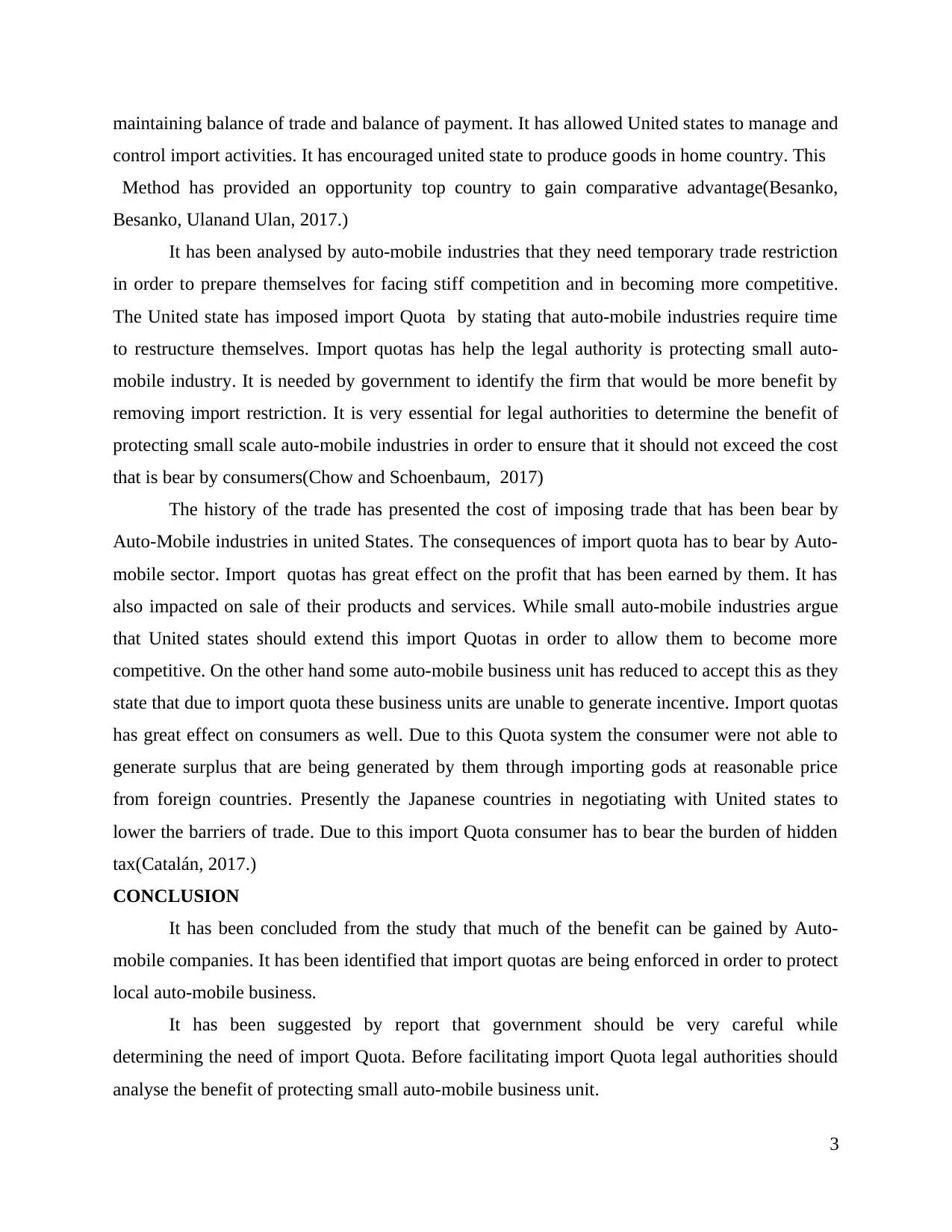
maintaining balance of trade and balance of payment. It has allowed United states to manage and
control import activities. It has encouraged united state to produce goods in home country. This
Method has provided an opportunity top country to gain comparative advantage(Besanko,
Besanko, Ulanand Ulan, 2017.)
It has been analysed by auto-mobile industries that they need temporary trade restriction
in order to prepare themselves for facing stiff competition and in becoming more competitive.
The United state has imposed import Quota by stating that auto-mobile industries require time
to restructure themselves. Import quotas has help the legal authority is protecting small auto-
mobile industry. It is needed by government to identify the firm that would be more benefit by
removing import restriction. It is very essential for legal authorities to determine the benefit of
protecting small scale auto-mobile industries in order to ensure that it should not exceed the cost
that is bear by consumers(Chow and Schoenbaum, 2017)
The history of the trade has presented the cost of imposing trade that has been bear by
Auto-Mobile industries in united States. The consequences of import quota has to bear by Auto-
mobile sector. Import quotas has great effect on the profit that has been earned by them. It has
also impacted on sale of their products and services. While small auto-mobile industries argue
that United states should extend this import Quotas in order to allow them to become more
competitive. On the other hand some auto-mobile business unit has reduced to accept this as they
state that due to import quota these business units are unable to generate incentive. Import quotas
has great effect on consumers as well. Due to this Quota system the consumer were not able to
generate surplus that are being generated by them through importing gods at reasonable price
from foreign countries. Presently the Japanese countries in negotiating with United states to
lower the barriers of trade. Due to this import Quota consumer has to bear the burden of hidden
tax(Catalán, 2017.)
CONCLUSION
It has been concluded from the study that much of the benefit can be gained by Auto-
mobile companies. It has been identified that import quotas are being enforced in order to protect
local auto-mobile business.
It has been suggested by report that government should be very careful while
determining the need of import Quota. Before facilitating import Quota legal authorities should
analyse the benefit of protecting small auto-mobile business unit.
3
control import activities. It has encouraged united state to produce goods in home country. This
Method has provided an opportunity top country to gain comparative advantage(Besanko,
Besanko, Ulanand Ulan, 2017.)
It has been analysed by auto-mobile industries that they need temporary trade restriction
in order to prepare themselves for facing stiff competition and in becoming more competitive.
The United state has imposed import Quota by stating that auto-mobile industries require time
to restructure themselves. Import quotas has help the legal authority is protecting small auto-
mobile industry. It is needed by government to identify the firm that would be more benefit by
removing import restriction. It is very essential for legal authorities to determine the benefit of
protecting small scale auto-mobile industries in order to ensure that it should not exceed the cost
that is bear by consumers(Chow and Schoenbaum, 2017)
The history of the trade has presented the cost of imposing trade that has been bear by
Auto-Mobile industries in united States. The consequences of import quota has to bear by Auto-
mobile sector. Import quotas has great effect on the profit that has been earned by them. It has
also impacted on sale of their products and services. While small auto-mobile industries argue
that United states should extend this import Quotas in order to allow them to become more
competitive. On the other hand some auto-mobile business unit has reduced to accept this as they
state that due to import quota these business units are unable to generate incentive. Import quotas
has great effect on consumers as well. Due to this Quota system the consumer were not able to
generate surplus that are being generated by them through importing gods at reasonable price
from foreign countries. Presently the Japanese countries in negotiating with United states to
lower the barriers of trade. Due to this import Quota consumer has to bear the burden of hidden
tax(Catalán, 2017.)
CONCLUSION
It has been concluded from the study that much of the benefit can be gained by Auto-
mobile companies. It has been identified that import quotas are being enforced in order to protect
local auto-mobile business.
It has been suggested by report that government should be very careful while
determining the need of import Quota. Before facilitating import Quota legal authorities should
analyse the benefit of protecting small auto-mobile business unit.
3
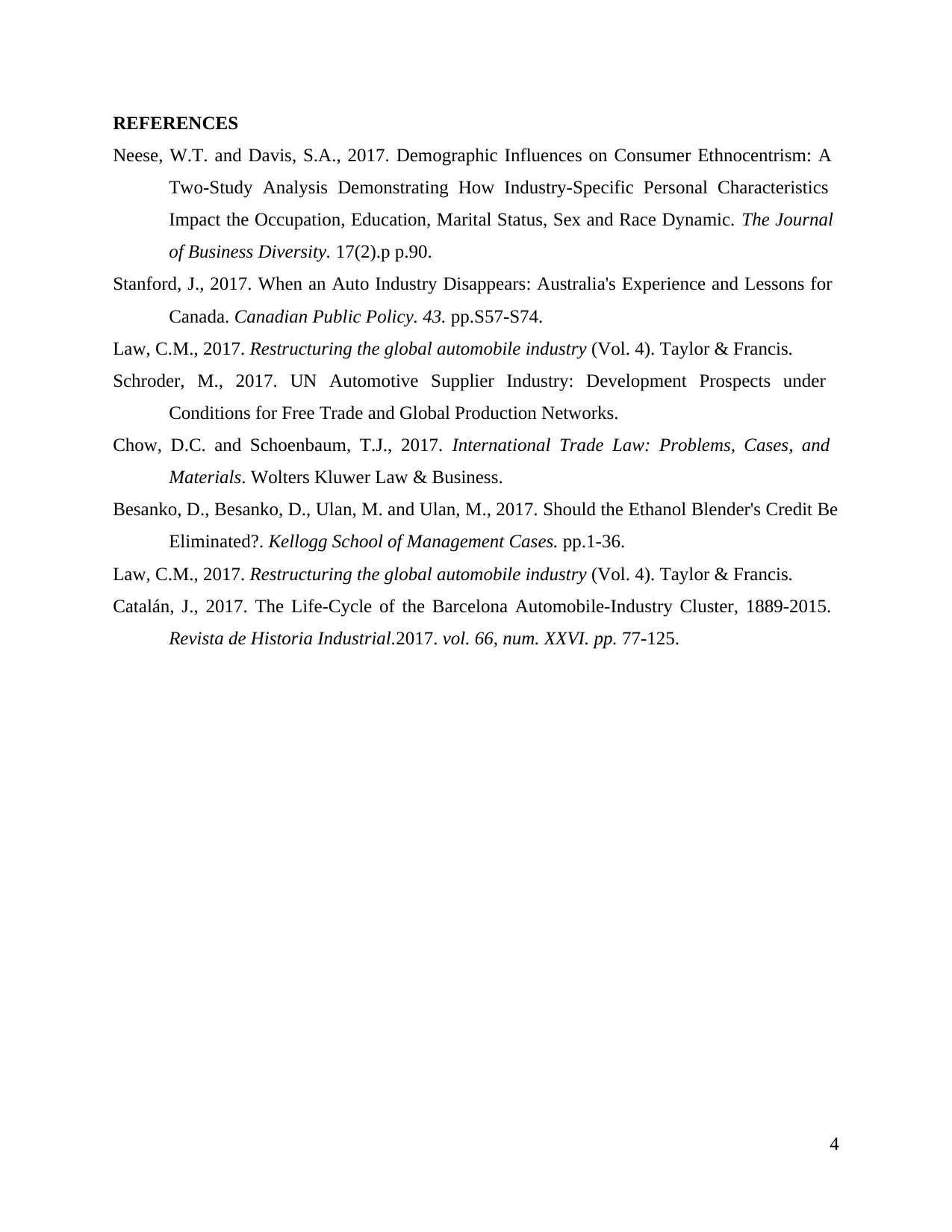
REFERENCES
Neese, W.T. and Davis, S.A., 2017. Demographic Influences on Consumer Ethnocentrism: A
Two-Study Analysis Demonstrating How Industry-Specific Personal Characteristics
Impact the Occupation, Education, Marital Status, Sex and Race Dynamic. The Journal
of Business Diversity. 17(2).p p.90.
Stanford, J., 2017. When an Auto Industry Disappears: Australia's Experience and Lessons for
Canada. Canadian Public Policy. 43. pp.S57-S74.
Law, C.M., 2017. Restructuring the global automobile industry (Vol. 4). Taylor & Francis.
Schroder, M., 2017. UN Automotive Supplier Industry: Development Prospects under
Conditions for Free Trade and Global Production Networks.
Chow, D.C. and Schoenbaum, T.J., 2017. International Trade Law: Problems, Cases, and
Materials. Wolters Kluwer Law & Business.
Besanko, D., Besanko, D., Ulan, M. and Ulan, M., 2017. Should the Ethanol Blender's Credit Be
Eliminated?. Kellogg School of Management Cases. pp.1-36.
Law, C.M., 2017. Restructuring the global automobile industry (Vol. 4). Taylor & Francis.
Catalán, J., 2017. The Life-Cycle of the Barcelona Automobile-Industry Cluster, 1889-2015.
Revista de Historia Industrial.2017. vol. 66, num. XXVI. pp. 77-125.
4
Neese, W.T. and Davis, S.A., 2017. Demographic Influences on Consumer Ethnocentrism: A
Two-Study Analysis Demonstrating How Industry-Specific Personal Characteristics
Impact the Occupation, Education, Marital Status, Sex and Race Dynamic. The Journal
of Business Diversity. 17(2).p p.90.
Stanford, J., 2017. When an Auto Industry Disappears: Australia's Experience and Lessons for
Canada. Canadian Public Policy. 43. pp.S57-S74.
Law, C.M., 2017. Restructuring the global automobile industry (Vol. 4). Taylor & Francis.
Schroder, M., 2017. UN Automotive Supplier Industry: Development Prospects under
Conditions for Free Trade and Global Production Networks.
Chow, D.C. and Schoenbaum, T.J., 2017. International Trade Law: Problems, Cases, and
Materials. Wolters Kluwer Law & Business.
Besanko, D., Besanko, D., Ulan, M. and Ulan, M., 2017. Should the Ethanol Blender's Credit Be
Eliminated?. Kellogg School of Management Cases. pp.1-36.
Law, C.M., 2017. Restructuring the global automobile industry (Vol. 4). Taylor & Francis.
Catalán, J., 2017. The Life-Cycle of the Barcelona Automobile-Industry Cluster, 1889-2015.
Revista de Historia Industrial.2017. vol. 66, num. XXVI. pp. 77-125.
4
⊘ This is a preview!⊘
Do you want full access?
Subscribe today to unlock all pages.

Trusted by 1+ million students worldwide
1 out of 6
Related Documents
Your All-in-One AI-Powered Toolkit for Academic Success.
+13062052269
info@desklib.com
Available 24*7 on WhatsApp / Email
![[object Object]](/_next/static/media/star-bottom.7253800d.svg)
Unlock your academic potential
Copyright © 2020–2026 A2Z Services. All Rights Reserved. Developed and managed by ZUCOL.





